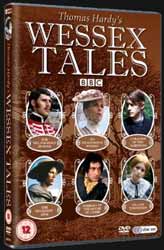|
Click here to return to the main site. DVD Review
Thomas Hardy’s (1840-1928) Wessex Tales originally began as a collection of pastoral short stories which were first published in 1888 and examined the lives of rural England, especially as it dealt with the concepts of class, women and social standing. In 1973, the BBC continued its acknowledgement of Hardy as an important writer by adding these tales to the other adaptation’s of his work. However this was not to be just any old adaptation as the BBC drew in the best talent, both in writing and acting to do justice to Hardy’s work. Thomas Hardy’s Wessex Tales consists of six stories: The Melancholy Hussar, An Imaginative Woman, A Tragedy of Two Ambitions, The Withered Arm, Barbara of the House of Grebe and Fellow Townsmen - spread across two DVD’s. I’ll have to admit to a personal dislike of Hardy’s work which neither displayed the wit and caricature of Dickens's work nor the social romantic frivolity of the Bronte’s. His tales tended to contain dour characters trapped in their social cast and circumstances and the tales contained here display Hardy’s usual lack of mirth. My favourite story had to be A Tragedy of Two Ambitions (21 Nov, 1973, BBC2), if for no other reason than it was adapted by Dennis Potter and stars John Hurt (Joshua Harlborough) and David Troughton (Cornelius Harlborough) in a tale about two sons who, having joined the Clergy look now on their drunken father as a social embarrassment, one they would wish to remove by any means. The tales haven’t been restored and there is obvious grain on all the episodes, but Hurt and Troughton draw you into the tale and this is quickly forgotten. Whether a modern audience would continence death as a social weapon is another story. Fellow-Townsmen (14 Nov, 1973, BBC2), starring Jane Asher is another tale about the brevity of love as we view Barnet and Downe who are old but estranged friends. Barnet has done well in life and has become prosperous as a merchant but love has eluded him, which is in stark contrast to Downe, who has a near perfect marriage. An unexpected meeting sets a train of event in motion which changes both lives. The Withered Arm (7 Nov, 1973, BBC2), adapted by Rhys Adrian and starring Billie Whitelaw is another tale of thwarted love and witchcraft. Farmer Lodge brings his new bride home, in the following events her arm withers and she travels to Casterbridge to touch the neck of a hanged man. Although this is the spine of the story the narrative is really about how love can often be meaningless. An Imaginative Woman (28 Nov, 1973, BBC2), starring Claire Bloom is a tale about Ella who falls for Robert Trewe, after her husband rents his lodgings. As well as a tale of a doomed love the story has a subtext of sexual discrimination, as Ella, herself a poet, has to publish under a male name as no one, at the time, was interested in poetry written by a woman. If you think that this is absurd don’t forget that at about the same time as Hardy was publishing his novels so was George Elliot, better known as Mary Ann Evans (22 November 1819 - 22 December 1880). The Melancholy Hussar (5 Dec, 1973, BBC2), starring Ben Cross (Matthaus Tina) tells how Phyllis Grove’s (Mary Larkin) live is affected by the arrival of a Hussar in her sleepy Dorset idyll. Last but not least is Barbara of the House of Grebe (12 Dec, 1973, BBC2), adapted by David Mercer and starring Nick Brimble and Ben Kingsley and this tale brings together every aspect of Hardy’s writing, including social status, the use of love as a possession rather than an emotion as we see the tale of Barbara who marries Edmond, considered to be beneath her station, much to the chagrin of Lord Uplandtowers who was rather hoping to have her for himself. Edmond is sent abroad to better his education but becomes disfigured saving others from a fire. On his return home Barbara cannot stand to look at him so he leaves, later to die and she marries Uplandtower, which pretty much makes everybody miserable. I don’t deny Hardy’s influence or importance as a novelist however as previously stated he isn’t known for looking on the bright side of life. Still each show has high production values and some great acting. There are a couple of text based extras - Thomas Hardy Biography and Bibliography, Cast Filmographies - as well as a picture gallery. A must for Hardy fans, the stories may prove a little hard going for the casual viewer. 6 Charles Packer |
|---|

